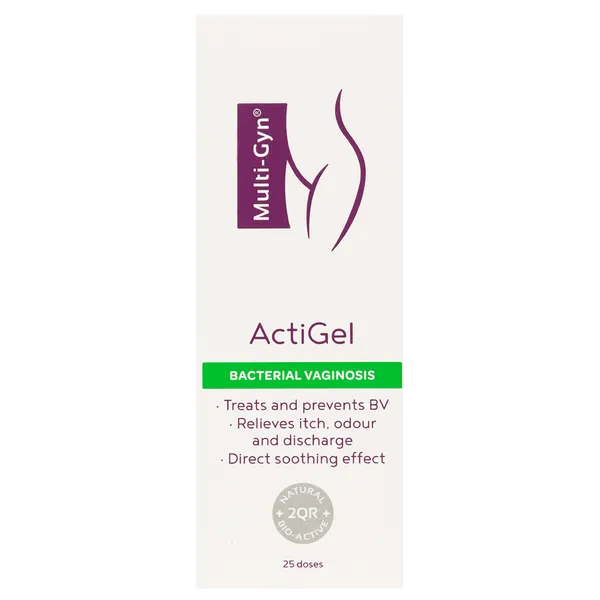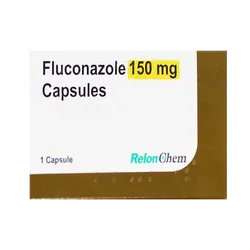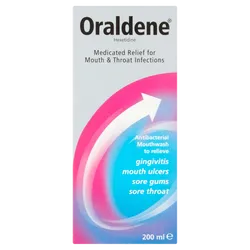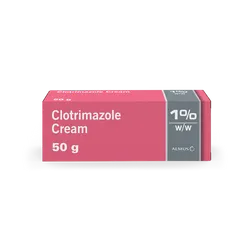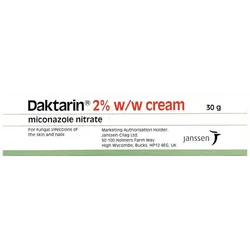Multi-Gyn ActiGel - Prevents and treats vaginal discomforts
- Prevents and treats bacterial vaginosis (BV)
- Reduces unpleasant odor and discharge
- Has a direct soothing effect on itch and irritations
- Provides direct relief of vaginal discomforts
- Optimizes the vaginal flora and condition of the tissues
- Counters yeast
- Is safe and natural
ActiGel is based on the patented 2QR-complex. This natural substance is derived from medicinal plants and consists of bio-active polysaccharides. It has the unique ability to block adhesion of harmful bacteria and in this way it neutralizes these bacteria effectively. This natural blocking effect is completely safe and harmless because it is not based on toxic substances or harsh chemicals and therefore it does not have negative side-effects.
On top of its key effect of blocking harmful microbes, Multi-Gyn ActiGel supports the natural repair system of the tissues and optimizes the condition of the mucosa. It directly installs the optimal vaginal acidity (pH-value). The useful lactobacilli (lactic acid bacteria) are stimulated in their development and in this way Multi-Gyn ActiGel creates an optimal and natural flora that prevents discomforts.
Background information
Intimate discomforts are more common than you may think. Many women will recognize the problem: irritation, soreness, burning sensation, unpleasant odor or discharge, sensitivity during or after making love, irritated labia and itch. Itch, burning sensation or irritation often worsen because of tight clothes, humid panty liners or hygienic bandages. Multi-Gyn ActiGel is the effective and natural solution to all such intimate discomforts.
Bacterial Vaginosis
What is bacterial vaginosis?
Bacterial vaginosis is a disturbance -a misbalance- in the vaginal environment caused by bacteria. The vagina normally contains a lot of "good" bacteria, called lactobacilli, and a few other types of bacteria, called coccoid bacteria. Lactobacilli are responsible for the healthy vaginal acidity in which the coccoid bacteria don't grow well.
Loss of this vaginal acidity and the presence of too many coccoid bacteria is called "bacterial vaginosis".
How do I know I have bacterial vaginosis?
You may notice a different discharge from your vagina. The discharge may be clear or colored and may be excessive. It most often has a fishy smell, especially after unprotected intercourse. Often you will suffer of vaginal discomforts such as itch, irritations, sensitivity, redness, and soreness. Some women have bacterial vaginosis without any symptoms. The vaginal acidity is always abnormal; pH
If this is an infection, did I catch it from someone?
No, not with normal hygiene. Bacterial vaginosis is an overgrowth of bacteria that are often present in the vagina, because of the proximity of the anus. While it's more common in women who are sexually active, it also occurs in women who are not sexually active.
Does it have to be treated?
Yes. Bacterial vaginosis is a truly undesirable vaginal flora. If bacterial vaginosis is not treated, the bacteria may get up into the uterus and cause serious problems. Treatment is especially important in pregnant women. Of course prevention is always best.
Yeast
What is yeast?
Yeast (fungus) has 2 phases; a spore phase that does not cause problems and a threadlike phase that can cause problems. Like the lactobacilli yeast needs cell sugar for its growth and are in competition over this food source. Therefore yeast is mostly found in a vaginal environment with a normal (optimal) acidity.
How do I know I have yeast?
You will most often notice a non-smelly, white, cottage cheese like discharge and suffer of vaginal discomforts such as itch, irritations, sensitivity, redness, and soreness.
If this is an infection, did I catch it from someone?
Not necessarily. Yeast is often just an uninvited guest. However when you suffer recurrent infections, it might be that your partner is a source. Recurrent yeast infections are often seen in diabetes, because of the sugar, the food source of yeast. A low resistance to yeast infections is also seen in families, so there is a genetic background as well.
Does it have to be treated?
Contrary to bacterial vaginosis, yeast is not a really dangerous vaginal infection. It is however a great nuisance and affects the quality of life very much. When suffering infectious complaints, treatment with special antifungal medication is therefore indicated. Prevention is of course always best.
